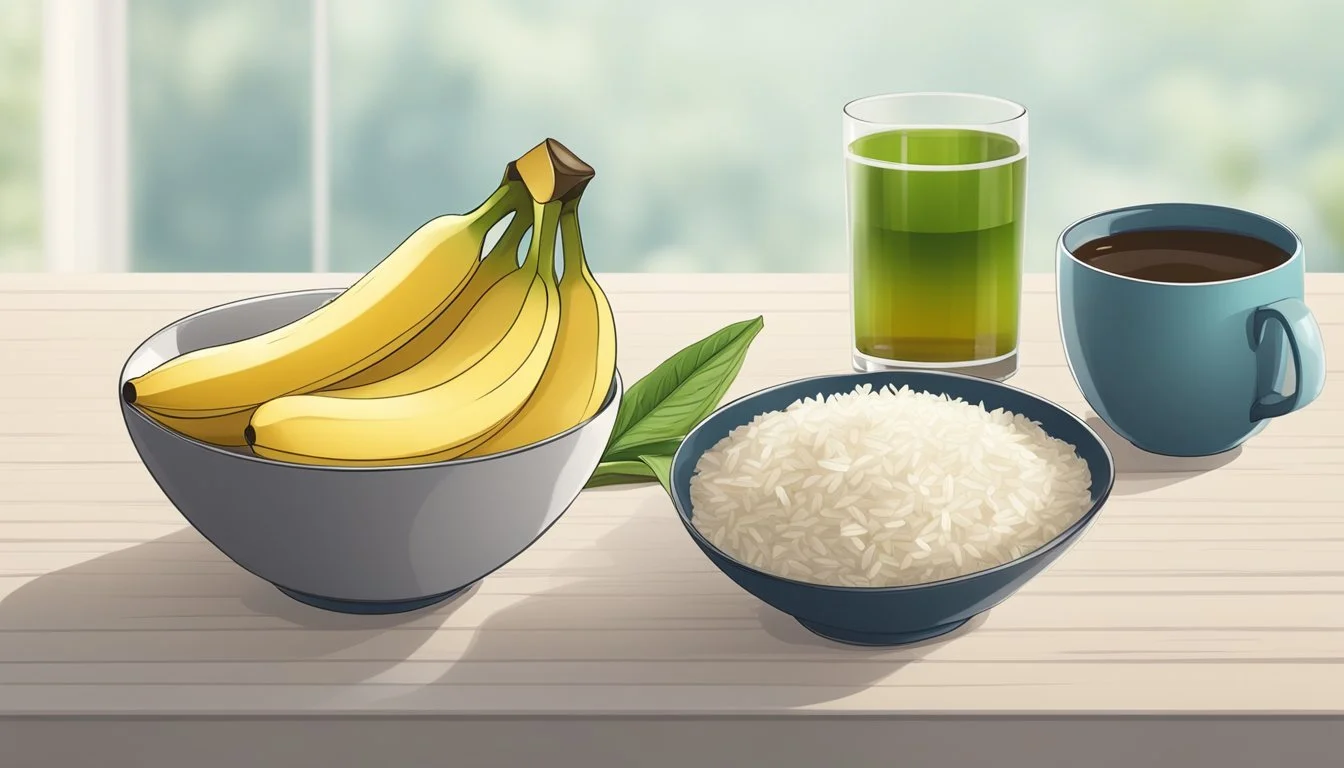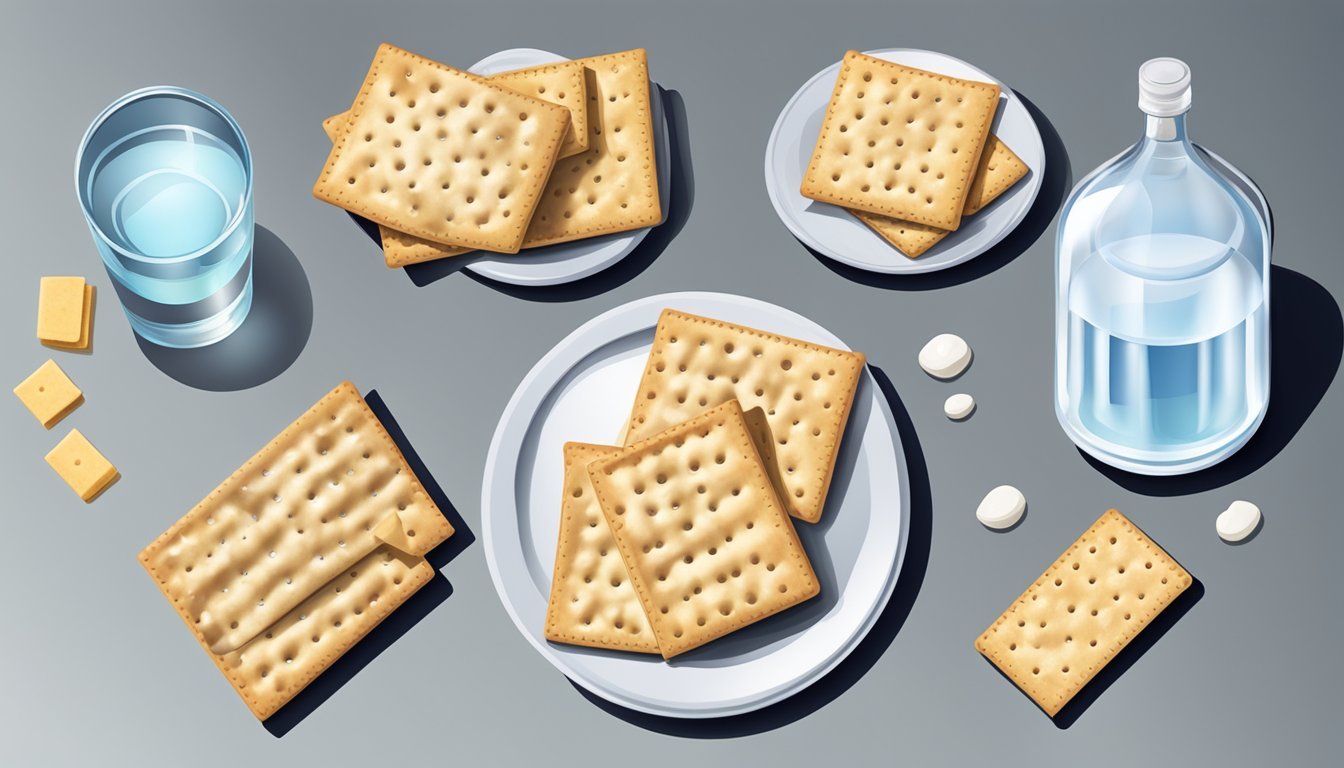Gut-Soothing Foods to Alleviate Diarrhea: The BRAT Diet and Beyond
Diarrhea is a common digestive issue that affects many people at various points in their lives. Knowing what foods to consume can make a significant difference in recovery and overall well-being. Selecting appropriate foods is crucial to managing symptoms and promoting quicker recovery.
The right dietary choices can help alleviate discomfort and support the digestive system. In this article, you will learn which foods to eat and avoid, ensuring a smoother path back to health.
1) Bananas
Bananas are highly recommended for people experiencing diarrhea. They are easy to digest and provide essential nutrients like potassium, which can be lost during bouts of diarrhea.
The resistant starch in bananas helps bind stool and reduce diarrhea severity. This makes them a practical choice for anyone needing quick relief.
Furthermore, bananas have a mild flavor and soft texture. This makes them gentle on the stomach, preventing additional irritation. Their natural sugars can also provide a quick energy boost.
Eating them ripe is best as unripe bananas may be harder to digest for some individuals. Adding bananas to the diet can be a simple yet effective way to manage diarrhea symptoms.
2) White rice
White rice is a staple food often recommended for those experiencing diarrhea. Its low fiber content makes it easier to digest, reducing irritation in the digestive tract.
The bland nature of white rice helps to firm stools. Unlike brown rice or other whole grains, white rice doesn't stimulate the digestive process as vigorously.
Cooking white rice in plain water is advisable. Adding seasonings or spices should be avoided, as they can irritate an already sensitive stomach.
Some people may find that white rice paired with clear broth is palatable and soothing. This combination provides additional hydration, which is essential when managing diarrhea.
White rice can also be served alongside other binding foods like bananas or applesauce. These foods have a complementary effect in firming stools and easing digestive distress.
Overall, white rice is a practical option for those looking to stabilize their digestive system and manage symptoms effectively during bouts of diarrhea.
3) Applesauce
Applesauce is a recommended food for managing diarrhea. It is easy to digest and provides a soothing effect on the digestive system. Unlike whole apples, applesauce is less irritating to the intestines.
Applesauce contains pectin, a type of soluble fiber that helps to bulk up stools and reduce the frequency of diarrhea episodes. This makes it a helpful choice for those dealing with digestive issues.
The natural sugars in applesauce can provide a quick energy boost, which can be beneficial when other more complex foods are hard to digest. Moreover, applesauce's mild flavor is gentle on an upset stomach.
Choosing plain, unsweetened applesauce is important. Added sugars and preservatives can aggravate diarrhea symptoms. Always check the ingredient list to ensure only apples and possibly water are included.
4) Toast
Toast is a staple in the BRAT diet, which is often recommended for those experiencing diarrhea. This diet consists of Bananas, Rice, Applesauce, and Toast. Toast is easy to digest and helps provide the body with energy while being gentle on the stomach.
Toasted bread, especially white bread, is low in fiber, which can help firm up stools and reduce the frequency of bowel movements. Fiber-rich foods, like whole grains, can aggravate diarrhea, so plain white toast is a preferable option.
When preparing toast for someone with diarrhea, it is best to avoid adding butter, jams, or other toppings that may contain high-fat content or sugars. These additions can irritate the stomach and potentially worsen symptoms.
Plain toast can be eaten on its own or with a little bit of applesauce for added flavor, but it should be kept simple to maintain its efficacy in soothing digestive issues.
5) Oatmeal
Oatmeal is a recommended food for managing diarrhea. Its bland nature makes it easy to digest, reducing the risk of further irritating the digestive system. When dealing with an upset stomach, simple foods are key.
Oatmeal also contains soluble fiber, which helps to firm up stools. This can be particularly beneficial when experiencing loose bowel movements.
People often incorporate oatmeal gradually after managing liquids for 24 hours. This gradual introduction aids in ensuring the body can handle solid foods without adverse effects.
Additionally, oatmeal is a more nutritious option compared to other refined grains. Unlike refined wheat products, it offers more vitamins and minerals while still being gentle on an upset digestive system.
6) Plain crackers
Plain crackers are a staple for managing diarrhea. They are easy on the stomach and help absorb excess fluid in the intestines. These crackers are typically made with low-fiber flour, which makes them gentle on the digestive system.
Consuming plain crackers can help settle an upset stomach. They provide a simple source of carbohydrates and are less likely to cause irritation. When dealing with diarrhea, it’s crucial to choose foods that do not exacerbate the condition.
Adding plain crackers to a diet can offer a quick source of energy without the complexity of high-fiber or greasy foods. They pair well with other bland foods such as applesauce and toast.
They can also help alleviate hunger without causing further digestive issues. Keeping hydrated is essential, alongside consuming these simple, plain foods.
For those on the BRAT diet, plain crackers serve as a suitable addition. Whether at home or on the go, they offer a convenient option to help manage symptoms of diarrhea.
7) Boiled Potatoes
Boiled potatoes are a simple and effective food choice for those experiencing diarrhea. They are easy to digest and provide essential nutrients without irritating the digestive system.
Potatoes are rich in potassium, which helps replenish electrolytes lost during bouts of diarrhea. When boiled, they become soft and gentle on the stomach, making them an ideal choice for those with sensitive digestion.
Consuming peeled, boiled potatoes can also provide a mild source of energy. Unlike fried or heavily seasoned potatoes, the boiled variety avoids added fats and spices, which can aggravate symptoms.
When preparing boiled potatoes, it is best to avoid adding butter, oil, or strong seasonings. Keeping them plain ensures they remain gentle on the digestive tract, reducing the risk of further irritation.
8) Skinless chicken breast
Skinless chicken breast is recommended for those experiencing diarrhea due to its low-fat content and ease of digestion. It provides a good source of lean protein, which is essential for recovery and maintaining strength.
Skinless chicken should be prepared by boiling, baking, or grilling. Avoid adding heavy seasonings, oils, or spices that could irritate the stomach.
This mild protein option helps to settle the digestive system without causing additional distress. Eating small portions can aid in nutrient absorption without overwhelming the stomach.
9) Peppermint tea
Peppermint tea is widely known for its soothing effects on the digestive system.
It is often used to relieve symptoms related to diarrhea, including stomach cramps and bloating. The menthol in peppermint provides a calmative effect, calming gastrointestinal muscles.
This tea also has antibacterial, antiviral, and anti-inflammatory properties that can help alleviate a variety of digestive discomforts.
Peppermint tea can be a pleasant and effective remedy for those experiencing frequent stomach issues.
10) Chamomile Tea
Chamomile tea is often recommended for its soothing effects on the digestive system. It contains properties that may help alleviate symptoms of diarrhea. This herbal tea is known for its calming effect, which can assist in reducing the discomfort associated with gastrointestinal distress.
Chamomile has anti-inflammatory and antispasmodic properties. These traits can help relax the muscles in the intestines, potentially reducing cramps and spasms that contribute to diarrhea. Additionally, chamomile may help reduce the production of stomach acid and has been used to address other digestive issues like gas and irritable bowel syndrome (IBS).
People experiencing diarrhea may find relief by drinking chamomile tea. It can also be beneficial for those suffering from nausea and vomiting, as it can help soothe the stomach lining. Chamomile tea is generally considered safe for most people and can be consumed several times a day.
While chamomile tea has many potential benefits, it is important to ensure that the tea is pure and does not contain any additives that could potentially worsen symptoms. Always consult with a healthcare provider before starting any new remedy for diarrhea, especially if symptoms persist.
Understanding Diarrhea
Diarrhea, a common digestive issue, can result from various causes and presents with specific symptoms and timing that help in identifying its onset and progression.
Common Causes
Several factors can lead to diarrhea. Infections from bacteria, viruses, or parasites are primary culprits. E. coli, Norovirus, and Giardia are frequent offenders. Additionally, certain medications like antibiotics disrupt gut flora, causing diarrhea.
Food intolerances, such as lactose intolerance, are significant contributors. Consuming dairy can trigger symptoms in those affected. Chronic conditions like Crohn's disease or irritable bowel syndrome (IBS) can also result in recurrent diarrhea. Stress and anxiety may aggravate digestive function, further contributing to this condition.
Symptoms and Timing
Diarrhea manifests with several key symptoms. Frequent, loose, and watery stools are the most obvious indicators. Abdominal cramps, bloating, and an urgent need to use the bathroom often accompany it. In severe cases, dehydration can occur, marked by dry mouth, dizziness, and dark urine.
The timing of symptoms can vary. Acute diarrhea typically lasts one to two days and is often related to infections or food-related issues. Chronic diarrhea persists for more than four weeks, hinting at underlying health problems. Monitoring the duration and frequency of symptoms is crucial for proper diagnosis and treatment.
Dietary Considerations
When dealing with diarrhea, it is crucial to consider both the foods to avoid and the importance of hydration and electrolytes to support recovery and maintain balance in the body.
Foods to Avoid
Certain foods can exacerbate symptoms of diarrhea and should be avoided. High-fiber foods like whole grains, nuts, and seeds can further irritate the digestive system. Additionally, spicy foods, dairy products, and fatty or greasy foods should be minimized as they can trigger more bowel movements.
Artificial sweeteners such as sorbitol, mannitol, and xylitol found in diet drinks and sugarless gums can also aggravate diarrhea. Opt for refined grains like white bread and regular pasta, which can help firm stools.
Hydration and Electrolytes
Maintaining hydration is critical when experiencing diarrhea. The body loses significant amounts of fluids and electrolytes, which should be replenished promptly. Water is essential, but incorporating electrolyte-rich beverages like oral rehydration solutions can be more effective.
Bananas, white rice, and potatoes are also excellent choices because they help replace lost potassium. Avoid caffeine and alcohol, as these can dehydrate the body further. Injectable solutions prescribed by healthcare providers may be necessary in severe cases to restore the body’s balance effectively.






